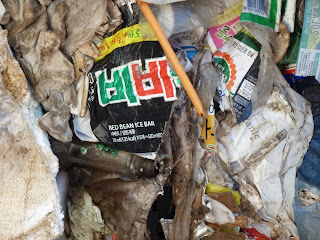Toxics Watchdog Warns that Chemical Found in Fake Rice Banned in Cosmetics and Toys
https://www.blogger.com/blogger.g?blogID=36167822#editor/target=post;postID=9108697357020981905
The chemical contaminant found in samples of fake rice from Davao City is prohibited in
cosmetics and toys and must not be present in foodstuff, particularly rice, a
staple food source.
The EcoWaste Coalition, a
watchdog group promoting human and ecological health, expressed shock over the
detection of dibutyl phthalate (DBP) on fake rice as analyzed by the National
Food
Authority - Food Development Center (NFA-FDC).
“We are deeply alarmed by the
discovery of toxic DBP in synthetic rice that has reportedly penetrated the
local market, particularly in the south,” stated Sonia Mendoza, a retired
chemist and President of the EcoWaste Coalition.
“The government should get to
the bottom of this trade in hazardous rice laced with a chemical that is banned
in the production of cosmetics and toys,” she said.
The use of DBP, a chemical
additive to adhesives and plastics, in concentration above 0.1% is prohibited
in children’s toys under the Department of Health Administrative Order
2009-0005-A as amended in December 2011.
DBP is also listed on Annex II,
Part 1 of the ASEAN Cosmetics Directive as among the substances that “must not
form part of the composition of cosmetic products.”
“The consumption of this tainted rice, especially by
pregnant women and young children, may expose consumers to DBP, which is known
to cause birth and reproductive disorders in laboratory animals,” Mendoza warned.
For instance, a published
study on rats by researchers at the School of Medicine at the Complutense
University of Madrid showed that the oral intake of DBP by their mothers during
pregnancy affected the offspring, with the effects being more apparent in the
reproductive development of male pups.
Aside from being a reproductive and developmental
toxicant in laboratory animals, exposure to DBP may also cause allergic reactions
leading to adverse health consequences, the EcoWaste Coalition said, citing a recent government health warning on a false nail
adhesive that has DBP as an ingredient.
The group recalled that the Food and Drugs Administration
(FDA) issued an advisory on February 11, 2015 against a DBP-containing artificial
nail adhesive that was brought to the agency’s attention by the EcoWaste Coalition.
According to FDA Advisory 2015-006, “DBP has the ability
to cause allergic reactions (and that)
there were previous cases where allergic response to DBP was found to be
severe.”
“Allergic reactions can induce a state of
hypersensitivity in the immune system,” the FDA said.
“It can cause the immune system to respond to chemical
exposures with immunological reactions that are harmful, varying from hives to
life threatening responses such as anaphylactic shock, where low blood pressure
and breathing difficulties can result in death,” it said.
The EcoWaste Coalition had earlier urged consumers to
exercise extra vigilance when buying rice and to immediately report any
unlawful sale of fake rice to the authorities by calling or texting the NFA
Bantay Bigas Hotline at 0906-4363133.
“Errant traders should be prosecuted and punished to the
full extent of the law,” the group said.
-end-
Reference:
http://home.doh.gov.ph/ais_public/aopdf/ao2009-0005-A.pdf
http://www.fda.gov.ph/issuances-2/cosmetic-laws-and-regulations-pertaining-to-all-regulated-cosmetic-products/cosmetic-memorandum-circular/226625-fda-advisory-no-2015-7
http://www.toxipedia.org/download/attachments/6000380/Oral+intake+of+DBP+.pdf





Comments